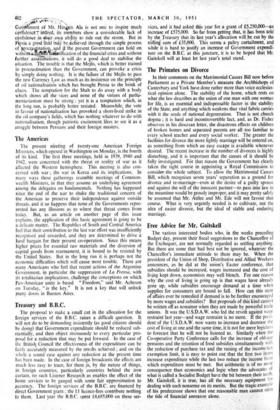The Americas
The present meeting of twenty-one American Foreign Ministers, which opened in Washington on Monday, is the fourth of its kind. The first three meetings, held in 1939, 1940 and 1942. were concerned with the threat or reality of war as it effected the Western hemisphere. This meeting is also con- cerned with war ; the war in Korea and its implications. In many ways these gatherings resemble meetings of Common-. wealth Ministers, in that they assume an underlying agreement among the delegates on fundamentals. Nothing has happened since the end of the war to shake .the traditional concern of the Americas to preserve their independence against outside threats, and it so happens that none.of the Governments repre- sented has any illusions as to where that threat comes from today. But, as an article on another page of this issue explains, the application of this basic agreement is going to be a delicate matter. The Republics of South and Central America feel that their contribution to the last war effort was insufficiently recognised and rewarded, and they are determined to drive a hard bargain for their present co-operation. Since this means higher prices for essential raw materials and the diversion of capital goods from rearmament, it is bound to be resisted by the United States. But in the long run it is perhaps not the economic difficulties which will cause most trouble. There are many Americans who feel that recent actions of the Argentine Government, in particular the suppression of La Prensa, with its totalitarian implications, challenge the conceptions on which Pan-American unity is based " Freedom." said Mr. Acheson on Tuesday, " is the key." It is not a key that will unlock many doors in Buenos Aires.






























 Previous page
Previous page